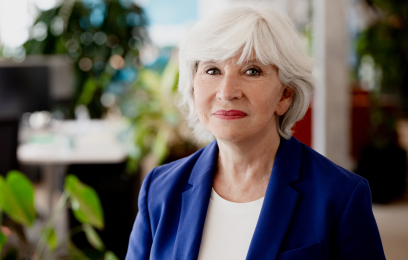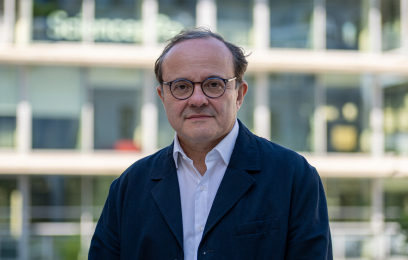Joint press release, CIVICA, March 2019
Building on already strong existing ties, seven world-leading institutions decide to further
unite to create the European University of Social Sciences. Through an alliance of both longterm
strategic goals and joint concrete activities that will benefit students, faculty, staff and
impact the broader public, CIVICA will prototype the university of tomorrow, it will generate
innovative solutions to the world's most pressing challenges inspired by the social sciences,
and it will promote European civic values.
Bocconi University (Italy), Central European University (Hungary), the European University Institute
(European Intergovernmental Organization), the Hertie School of Governance (Germany), the
National University of Political Studies and Public Administration (Romania), Sciences Po (France)
and the Stockholm School of Economics (Sweden) have submitted a joint application under the
name “CIVICA - The European University of Social Sciences” to become one of the pilot European
Universities in the first round of Erasmus+ applications in February 2019.
In a joint long-term mission statement, the seven Presidents recognize the special role of
European social sciences in generating solutions to the world’s most pressing challenges. CIVICA
embodies their ambition, as forward-thinking higher education institutions, to assume their civic
responsibility as Europeans towards the future European generations and towards the role of
Europe in the world:
“As world leading European institutions of social sciences, we are united in a unique mission: We
want to educate the next generation of professionals who serve their societies across sectors,
whose minds are concentrated on tackling the most pressing problems of the world, and who are
driven by values of democracy, respect and civic resilience”.
CIVICA aims to unite leading European higher education institutions in the social sciences, the
humanities, business management and public policy to form a broad European inter-university
campus that links teaching and learning, research and innovation, and society at large across
cultural, linguistic, and national borders. It will connect 38,000 students recruited from across
Europe and all over the world to a community of 7,000 faculty members and some 3,000
administrative staff. CIVICA will also be joined by the London School of Economics as an Associated
partner on many levels, and an ambitious set of activities will be dedicated to the international
attractiveness and competitiveness of the alliance.
Being able to build upon decades of successful partnerships amongst many of the partners, and
on the new complementarity sets of expertise that can be foreseen, the seven partners have a
unique capacity to engage in long-term joint strategic goals as well as immediate concrete action,
at all levels of their institutions. The more than 100-page long CIVICA project already provides the
frame for prototyping and testing operational trans-European activities for the emergence of a
European University. The proposal includes:
• The building of the physical and digital spaces and systems supporting a networked European
Campus for learning, knowledge production and application;
• At the Bachelor level, a multi-campus, interdisciplinary bachelor’s education experience with a
core focus on civic engagement;
• At the Masters level, a flagship multi-campus integrated course involving hundreds of students
in team-work across Europe and dozens of faculty to respond to contemporary European and
global challenges. Joint policy labs, incubators and capstone projects and hackathons with the
same objective of combining education, research and innovation while also contributing to
more European identity.
• At the Doctoral level, the emergence of an integrated European space for European Early Stage
Researchers in the Social Sciences and Humanities based on a trans-European hub for
mentoring and supervision
• Recognising the special role the social sciences must play in tackling global problems, four
dedicated multi-campus knowledge creating teams will be created to conduct results-oriented
joint work and feed in the three levels of the European campus: Challenges to Democracy in
the XXIst Century; Societies in Transition and Crises of Earth; Europe Revisited; and Data Driven
Technologies for the Social Sciences.
• CIVICA is to be an active agent in European society. Trans-European actions for civic
engagement and inclusion will include University for all Tours d'Europe, the promotion of
access to higher education for all and the Open learning initiative for refugees and asylum
seekers.
Through coordinated strategic planning, transformative governance and integrated activities,
including embedded mobility at all levels, joint and flexible curricula, a networked approach to the
students’ preparation for careers, civic commitment and hands-on societal outreach, CIVICA will
contribute to the international competitiveness of the partners of the alliance and the European
Higher Education Area and it will generate solutions to persistent European and world challenges.
CIVICA – the European University of Social Sciences is certainly formed at a momentous time in
European history; it shall strongly impact the future of Europe and the higher education sector
globally.
Press contacts
• Bocconi University: Tomaso Eridani: tomaso.eridani@unibocconi.it
• Central European University: Ildiko Rull, rullI@ceu.edu / +36 (1) 327 3800
• The European University Institute: Marco Incerti: Marco.Incerti@eui.eu / +39 055 4685 433
• The Hertie School of Governance: Nikolas von Hoffmann: hoffmann@hertie-school.org
• National University of Political Studies and Public Administration: Anca Goga:
anca.goga@snspa.ro / +40726.317.063
• Sciences Po (Main coordinator of CIVICA): Marie Frocrain: marie.frocrain@sciencespo.fr / +33
1 49 54 37 71
• The Stockholm School of Economics: Hanna Flodmark: hanna.flodmark@hhs.se

08.07.2025
SCIENCES PO LAUNCHES THE PARIS CLIMATE SCHOOL, LUIS VASSY APPOINTS LAURENCE TUBIANA AS DEAN
Paris, 1 July 2025 - A major project spearheaded by the President of Sciences Po, Luis Vassy, the Paris Climate School is the first European school in the humanities and social sciences dedicated to equipping future leaders with the tools to lead the transition, manage risks, and enhance the resilience of our societies.
This new school becomes Sciences Po's eighth graduate school. Starting in September 2026, it will offer a two-year English-taught Master in 'Ecological Transition, Risks and Governance', welcoming an initial cohort of around 100 students.
The school will be led by Laurence Tubiana, whose exceptional experience at the crossroads of science, diplomacy, and public policy reflects the Paris Climate School's ambition: to train and educate a new generation of decision-makers ready to face the ecological emergency.
Economist and diplomat, Laurence Tubiana has chaired the European Climate Foundation since 2017. She served as France's chief climate negotiator for COP21 and co-chaired the Citizens' Climate Convention in 2020. From January to June 2025, she co-chaired the Paris Climate School's preliminary mission with Sophie Dubuisson-Quellier, director of Research at CNRS and head of the Centre for the Sociology of Organisations (CSO) at Sciences Po.
Sophie Dubuisson-Quellier will head the Scientific Committee, composed of permanent faculty members and teachers who will be involved in the school.
'In light of the scale and urgency of the ecological crisis, we have a responsibility to act. With the launch of the Paris Climate School—Europe's first school dedicated to climate—we are preparing a new generation of intellectually equipped leaders, ready to understand the profound transformations ahead and to shape systemic solutions. The Paris Climate School will train professionals across the public and private sectors to finance, plan, and manage the transition. I am delighted that Laurence Tubiana has agreed to become Dean of the Paris Climate School. Her unique experience at the intersection of economics, climate diplomacy and public policy embodies the ambition of this school. It is a major milestone for Sciences Po.' Luis Vassy, President of Sciences Po
'I am immensely proud and excited to be named Dean of the Paris Climate School. Its creation comes at a decisive moment for our planet and our societies. Responding to the ecological emergency requires a new generation of thinkers and actors. Sciences Po has the potential to become a global leader on climate, by combining academic excellence, interdisciplinarity, and civic engagement.' Laurence Tubiana, Dean of the Paris Climate School
To find out more about the Paris Climate School.
Read more

